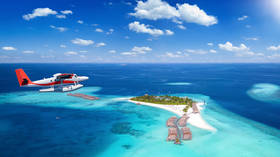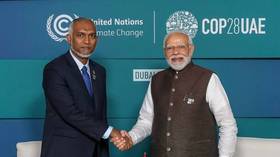India’s island neighbor to adopt its payment system despite political spat
The Maldives, a luxury tourism hotspot in the Indian Ocean, is gearing up to adopt India’s card payment service RuPay, according to the archipelago nation’s minister of economic development and trade, Mohamed Saeed. The official suggested the move will help the country, which is heavily dependent on tourism, bolster its local currency.
According to Saeed, who was cited by a local news portal, RuPay cards will be able to be used for transactions denominated in Indian rupees in the Maldives. However, no timeline was disclosed for launching the initiative.
RuPay is India’s indigenous payment card system, akin to Visa and MasterCard. It was launched by the National Payments Corporation of India (NPCI) in 2012. NCPI has also developed the Unified Payments Interface (UPI), a real-time payment system that allows money to be transferred between bank accounts.
Over the past two years, India has expanded these services internationally – primarily in countries that send the most remittances back to India, such as Bhutan, Nepal, Mauritius, Singapore, and the UAE. The UPI was separately adopted by Sri Lanka and France.
The Maldives and India first discussed measures to introduce RuPay cards in the island nation during a visit to India by former Maldivian President Ibrahim Mohamed Solih in August 2022. The move was meant to “boost travel and tourism and economic [links].”
Indians have traditionally accounted for the largest number of foreign tourists on the archipelago. However, their numbers dropped sharply this year after boycott calls were issued following comments by several Maldivian ministers about Indian Prime Minister Narendra Modi that were seen as derogatory by New Delhi.
The incident was part of a wider row as the Maldives, now led by President Mohamed Muizzu, who is seen as being pro-China, has been pivoting away from New Delhi. Immediately after being elected last year, Muizzu asked New Delhi to remove around 80 military personnel who were stationed on the islands in order to operate aircraft donated by India. The troops were withdrawn by mid-May and replaced by civilians.
However, during a recent visit to New Delhi, Maldives Foreign Minister Moosa Zameer expressed appreciation for India’s support in “advancing economic, trade, and investment ties between the two nations.” The visit took place days after New Delhi approved its highest-ever export quotas for essential commodities, including eggs, potatoes, onions, sugar, rice, wheat flour and pulses, river sand, and stone aggregates, to the Maldives under a unique bilateral mechanism.
Indian infrastructure projects in the Maldives are also gaining momentum despite the diplomatic tensions, Reuters reported, citing Indian officials earlier this year. India spent nearly 7.7 billion rupees ($93 million) on infrastructure projects in the island nation during the previous financial year ending in March.
The efforts include a $500-million project for roads and bridges around the capital city of Malé, and two airports worth nearly $130 million each on the archipelago’s distant islands, supported through a line of credit from India, the report noted.
Where India Meets Russia: Follow and share RT India on X and Instagram
You can share this story on social media:









Comments are closed.